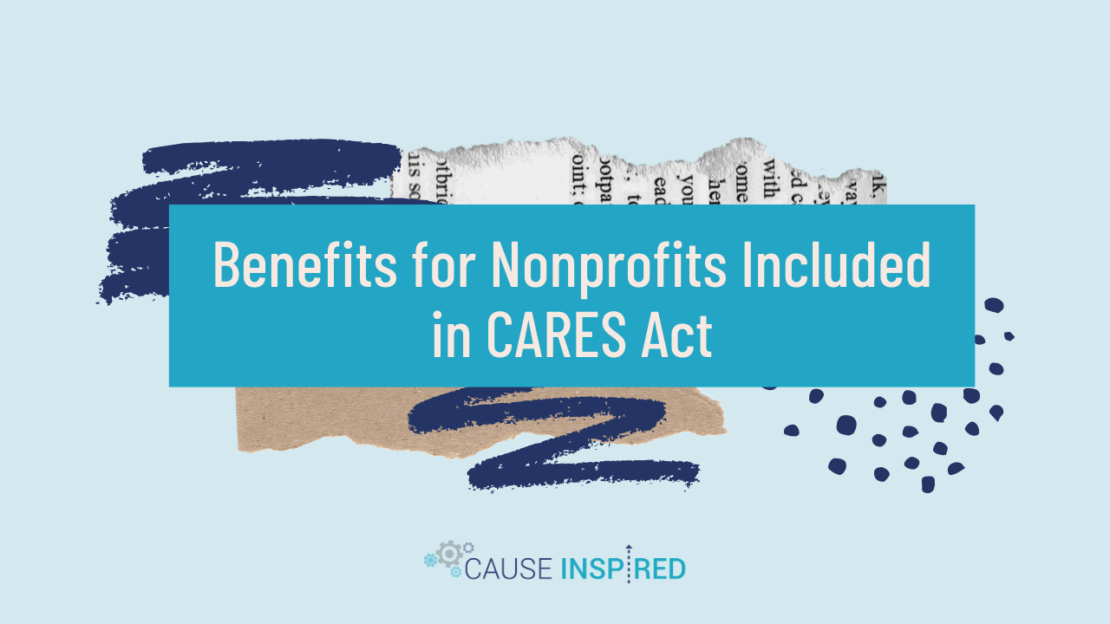Benefits for Nonprofits Included in CARES Act
Nonprofit organizations around the world are currently experiencing the same stress and concerns about the progression of the Coronavirus and how the disease will impact the economy, and society as a whole. During this time, many nonprofit organizations have been severely financially affected by the outbreak, and are understandably worried about how they will move forward. To help these organizations during this challenging and unprecedented time, the United States government has included financial aid opportunities in the Coronavirus Aid, Relief and Economic Security (CARES) Act for affected organizations.
We have outlined some of the ways in which the CARES Act will apply to both large and small nonprofit organizations, as well as some guidance on how to proceed with filing for assistance.
For small nonprofits, employing five hundred or fewer people, the following are potential opportunities that are available to your organization:
Small Business Administration (SBA) Loans & Loan Forgiveness
Known as the Paycheck Protection Program (PPP), the CARES Act provides SBA 7(a) loans of up to $10 million to nonprofits included under Section 501(c)(3), as well as tax-exempt veterans’ organizations under Section 501(c)(19).
The loan is intended to cover expenses incurred between February 15, 2020 and June 30, 2020. This can include payroll costs, health benefits during sick or family leave, salaries or commissions, interest on mortgage, rent, utilities and prior debt.
Fortunately for nonprofit organizations, they are eligible to have these loans forgiven, effectively turning the loans into grants. Forgiveness is available for the portion of the loan used for the following expenses during the covered period (8 weeks from origination):
- Payroll costs
- Interest on mortgage incurred before February 15, 2020
- Rent obligation incurred before February 15, 2020 and
- Utilities (electric, gas, water, transportation, phone, internet) for services that began before February 15, 2020
Beginning on April 3, 2020, nonprofits are able to apply for this loan. Nonprofits are able to apply at any lending institution that is approved to participate in the program through the existing SBA 7(a) lending program and additional lenders approved by SBA and the Department of Treasury. Nonprofits do not need to visit any government institution to apply for the program, and should begin gathering the suggested documentation as soon as possible.
Emergency Economic Injury Disaster Loans (EIDL) Grants
EIDL grants are low-interest loans that are provided through the SBA Disaster Loan Program and are intended to help businesses and homeowners recover from declared disasters. The recent CARES Act expands the eligibility for access to EIDL loans, and provides upfront grants to eligible ‘private’ nonprofits. The grants can be used to cover payroll costs, materials, rent, mortgage or other debt payments.
The CARES Act establishes an emergency grant to allow an eligible nonprofit that has applied for an EIDL loan due to COVID-19 to request an advance on that loan of up to $10,000, which the SBA is required to distribute within 3 days. Applicants are not required to repay any advance payments, even if they were denied for an EIDL loan. However, any advanced payments made would be counted towards the loan forgiveness amount under a 7(a) PPP loan.
Nonprofits can apply at any time during 2020. To apply for an EIDL loan, visit the SBA’s COVID-19 Economic Injury Disaster Loan Application. To be considered for an expedited loan advance of up to $10,000, select the checkbox at the end of the EIDL application.
Employee Retention Credit
The Employee Retention Credit provides a refundable payroll tax credit to cover 50% of wages that were paid by employers to employees during the COVID-19 crisis. The credit is available to employers who were either fully or partially suspended, either because of a COVID-19-related shut-down order, or if gross receipts declined by more than 50% when compared to the same quarter in the prior year.
The total wages attributed to an employee is capped at $10,000, including health benefits, resulting in a maximum credit of $5,000 per employee. For employers with 100 or fewer full-time employees, all employee wages can qualify for the credit, whether the employer is open for business or subject to a shut-down order.
Employers can be immediately reimbursed for the credit by reducing their required deposits of payroll taxes that have been withheld from employees’ wages by the amount of the credit.
Eligible employers will need to report their total qualified wages and the related health insurance costs for each quarter on their quarterly employment tax returns or Form 941 beginning with the second quarter. If the employer’s employment tax deposits are not sufficient to cover the credit, the employer may receive an advance payment from the IRS by submitting Form 7200, Advance Payment of Employer Credits Due to COVID-19.
Deferral of Payroll Taxes
This allows employers to defer payment of the employer share of Social Security taxes, which is 6.2% on employee wages. The provision applies to all employers, including nonprofits and there is not a limit on the number of employees that can take the deferral.
The deferred taxes are required to be paid over the following two years, with half of the amount paid by the end of 2021, followed by the other half by the end of 2022. The IRS has created a helpful Frequently Asked Questions webpage to guide organizations in this process.
Large nonprofit organizations that include over five hundred employees are eligible for EIDL grants, the Employee Retention Credit and the Deferral of Payroll taxes mentioned above. But they are also eligible for an additional opportunity.
Economic Stabilization Fund
The Economic Stabilization Fund provides up to $454 billion (of the $500 billion total fund) in financial assistance to businesses, including nonprofits. The United States Treasury has been given authority to develop a program to provide loans that cannot be forgiven to nonprofit organizations with between 500 and 10,000 employees. Any loans made under the program would be at an interest rate that could not exceed 2%. Nonprofits are not required to make payments in the first six months.
The borrower must make a good faith certification with respect to several items, including (but not limited to):
- Current economic conditions made the loan necessary.
- Loan proceeds will be used to retain 90% of the workforce at full compensation until September 30, 2020.
- The organization will restore not less than 90% of the workforce as of February 1, 2020 and restore all compensation and benefits to workers no later than 4 months after the termination of the COVID-19 public health emergency.
- The organization is domiciled in the United States with significant operations and employees in the United States.















